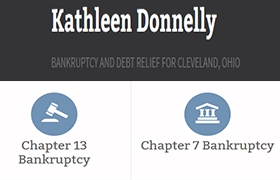Beachwood Collection Lawyer, Ohio
Sponsored Law Firm
-
 x
x

Click For More Info:
-
Law Office of Kathleen Donnelly
526 Superior Ave #1030 Cleveland, OH 44114» view mapChapter 7, Chapter 13, Free Evaluations Need Debt Relief? Contact Me Today
There is hope for debt relief. At the Cleveland, Ohio, law office of Kathleen Donnelly, we help people like you to escape from under mountains of debt.
800-413-4100
Michael Lawrence Fine
Lawsuit, Credit & Debt, Litigation, Collection
Status: In Good Standing *Status is reviewed annually. For latest information visit here
Christopher Patrick Kennedy
Intellectual Property, Pharmaceutical Product, Collection, Bankruptcy, Insurance
Status: In Good Standing *Status is reviewed annually. For latest information visit here Licensed: 23 Years
Eric Thomas Deighton
Real Estate, Litigation, International Other, Collection
Status: In Good Standing *Status is reviewed annually. For latest information visit here
William Louis Costello
Intellectual Property, Pharmaceutical Product, Insurance, Collection
Status: In Good Standing *Status is reviewed annually. For latest information visit here
James David Wilson
Litigation, Collection, Commercial Bankruptcy, Bankruptcy
Status: In Good Standing *Status is reviewed annually. For latest information visit here
Robert Edelstein
International Other, Workers' Compensation, Corporate, Collection, Administrative Law
Status: In Good Standing *Status is reviewed annually. For latest information visit here Licensed: 42 Years
Alvin Irvin Gilmore
Traffic, Divorce & Family Law, Collection
Status: In Good Standing *Status is reviewed annually. For latest information visit here Licensed: 63 Years
Laurence Joseph Powers
Medical Malpractice, Collection, Corporate, Employee Rights
Status: In Good Standing *Status is reviewed annually. For latest information visit here Licensed: 38 Years
Marc Lee Stolarsky
Juvenile Law, Dispute Resolution, Family Law, Collection
Status: In Good Standing *Status is reviewed annually. For latest information visit here Licensed: 29 Years
David E. Byrnes
Collection, Real Estate, Federal Appellate Practice, Estate
Status: In Good Standing *Status is reviewed annually. For latest information visit here Licensed: 15 Years

 Kathleen Donnelly Cleveland, Ohio
Kathleen Donnelly Cleveland, Ohio About UsKathleen Donnelly
About UsKathleen Donnelly Contact UsCall or Email Right Now
Contact UsCall or Email Right Now